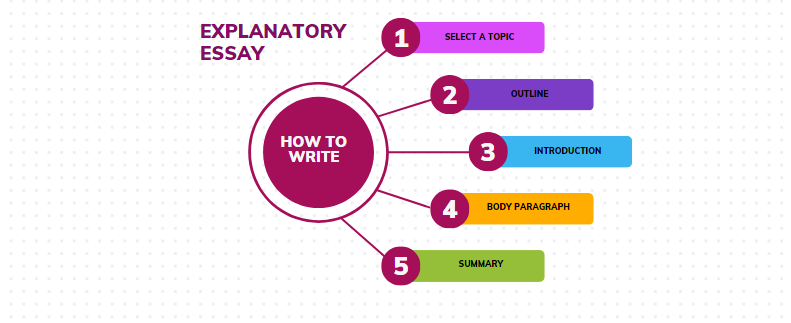Explanatory Essay Writing Guide
Sep 19,23
“Essay writing is tough, not because it demands the mastery of words, but because it requires the mastery of ideas.” – Unknown
Essay writing is one of the most challenging pieces of writing, especially writing an explanatory essay, which requires the writer to be more thorough than others. In this guide, we will explore – what is an explanatory essay, what makes it different from other essay types, and how to write a good explanatory essay.
What Makes an Explanatory Essay Different from Others?
A clear and comprehensive explanation, description or analysis of a specific topic, concept, or idea is the goal of an explanatory essay, sometimes referred to as an expository essay. An explanatory essay’s main objective and informational style are what distinguish it from other types of essays. Here are some distinguishing qualities that set an explanatory essay apart from others:
An explanatory essay differs from other essay genres and its main goal is to give a thorough and understandable explanation of a certain subject, idea, or concept. Explanatory essays do not incorporate the writer’s personal beliefs or prejudices, unlike argumentative essays, which try to persuade the reader to accept a specific viewpoint. Instead, they base their argument on statistics, facts, and other solid proof. Explanatory essays have this unbiased, objective approach that makes sure the emphasis is always on the information’s accessibility and clarity.
A unique structure is another characteristic of an explanation essay. It often starts with a succinct thesis statement that summarises the issue and establishes the goal of the explanation, then has body paragraphs that delve into the topic. These body paragraphs serve to explain things in a logical and structured way, frequently using examples, illustrations, or comparisons to help readers understand. Finally, a concise conclusion restates the main arguments without endorsing any particular point of view.
How to Write an Explanatory Essay?
Writing an explanatory essay entails providing a concise and comprehensive explanation of a subject or idea. Here is a step-by-step guide to assist you in creating a successful explanatory essay:
Select a Topic
Choose a subject or idea that you are knowledgeable about and that your audience would find fascinating or educational. Your professors may also provide you with a specific topic as part of the curriculum.
Research and Information Gathering
Research to compile pertinent facts, figures, and details regarding the subject. Make use of trustworthy resources such as books, scholarly articles, websites, and research papers. Organise your research materials and take notes.
Establish an Outline
Draw out a plan for your essay’s introduction, body paragraphs and conclusion. Decide on the main ideas or subtopics you wish to cover in each section.
Create a brief introduction
To pique readers’ interest, start with a hook or attention-grabbing sentence. Give some background data about the subject. Declare your thesis, which should express exactly what you plan to discuss in the essay. A good thesis statement should concisely present the main idea.
Build your body paragraphs
The outline of the essay depends on the information that you are trying to present and the length of the essay.
Each paragraph in the body should concentrate on a distinct idea or subtopic. Each paragraph should begin with a topic sentence relevant to your thesis. To support your explanations, use statistics, examples, and supporting evidence. Make sure the paragraph transitions are seamless.
Use Language That Is Simple and Clear
If your audience is not familiar with the jargon or excessively technical language, avoid using it. Make complicated concepts understandable to a broad audience. Any terms or ideas that your readers might not be familiar with should be defined.
Maintain Coherence and Clarity
To offer your explanations, use a logical and well-organised format. When describing processes or events, employ a chronological or cause-and-effect format. To help readers follow your essay’s progression, use transitional words and phrases.
Write a summary
Write a summary of the essay’s main themes. Reiterate your thesis using the new language. If applicable, provide readers with a concluding thought or a call to action.
Edit and Revision
Check your writing for grammatical faults, clarity, and cohesion. Verify the formatting and citation style for consistency. To make the essay better, ask your friends or teachers for input. As per the instructions from your instructor, format your essay.
Keep in mind that the purpose of an explanatory essay is to offer a concise and in-depth explanation of a subject. Consider your audience’s degree of expertise when writing and make an effort to make even the most difficult ideas understandable to all readers.
How Professional Essay Writing Help Can Benefit You?
For someone new to essay writing, creating an explanatory essay that ticks all the boxes, can be challenging. But, with a little help, you can navigate the academic hurdles easily. You can benefit from professional essay writing assistance from GoAssignementHelp’s experts by saving time, enhancing the calibre of your work and lowering stress.
Our expert essay writers ensure that your essays are thoroughly researched, well-structured, and grammatically error-free by combining their significant writing experience with their research expertise. They can assist you in meeting tense deadlines so you can concentrate on other crucial facets of your academic or professional life. Additionally, their expertise in a variety of disciplines guarantees the thoroughness and depth of your essays.
Use GoAssignementHelp for your explanatory essay writing now





0 responses on "Explanatory Essay Writing Guide"